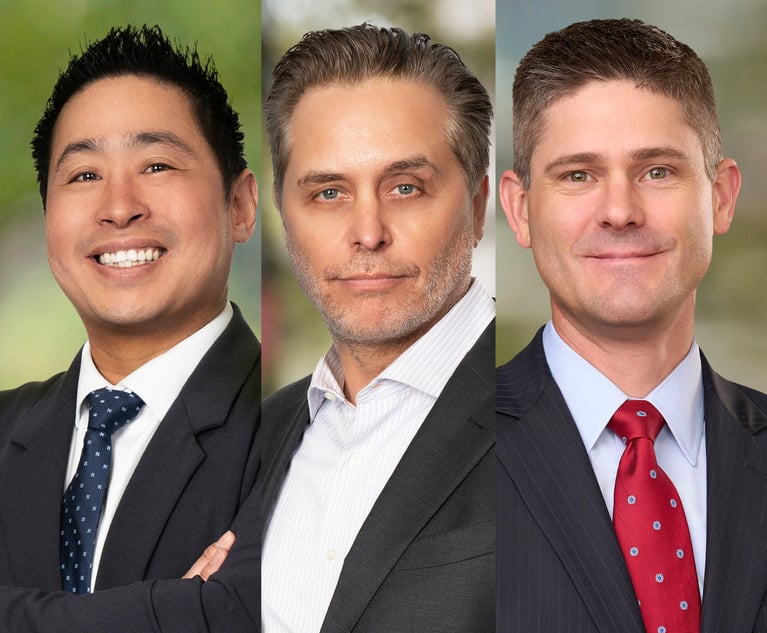Amici Say 'Hyundai' Rule Threatens to Devastate Class Action Settlements
The groups said Ninth Circuit ruling conflicts with its own precedent and decisions in the Third and Seventh circuits, parroting the arguments of plaintiffs and defendants Hyundai Motor America and Kia Motors America Inc. in dual petitions for en banc review filed earlier this month.
March 20, 2018 at 07:03 PM
5 minute read

A flurry of amicus groups on both sides of the class action bar urged the U.S. Court of Appeals for the Ninth Circuit to rehear en banc a decision that they say would effectively nullify nationwide settlements.
Public Justice, the Impact Fund, the American Tort Reform Association and three other groups, plus a law professor and a former federal judge, wrote in briefs filed on Monday that the Ninth Circuit's Jan. 23 panel decision in In re Hyundai and Kia Fuel Economy Standards would make it next to impossible to certify nationwide settlements. The 2-1 decision de-certified a nationwide class action settlement after concluding that the district judge failed to conduct an analysis over whether consumer laws in several states were so different from one another as to defeat the common claims of class members.
The groups said the ruling conflicts with its own precedent and decisions in the Third and Seventh circuits, parroting the arguments of plaintiffs and defendants Hyundai Motor America and Kia Motors America Inc. in dual petitions for en banc review filed earlier this month.

In a brief for the plaintiffs groups, Elizabeth Cabraser, of Lieff Cabraser Heimann & Bernstein, wrote that the decision “added requirements and shifted burdens” that would have “potentially devastating consequences for consumer class actions.”
“In practice, eviscerating nationwide settlements will not result in 50+ customized settlements tailored to the laws of each state and district, but rather, will operate to prevent settlements at all,” she wrote in the brief, filed by Public Justice, the Impact Fund, the National Consumer Law Center and the National Association of Consumer Advocates.
Public Justice Executive Director Paul Bland said the Hyundai decision would have a “very substantial” impact on nationwide class action settlements.
“The panel majority in Hyundai seems to create a sweeping rule that would make choice-of-law issues the predominant factor, that would bar nationwide settlements, in the majority of cases proceeding under state law, and would appear to require dozens of individual state-wide cases settling or adjudicating the same factual and legal issues again and again for all sorts of cases,” he wrote. “Hopefully, the Ninth Circuit will just return the situation to the status quo as it's existed for many years, and avoid the mass duplication and even chaos threatened by this broad panel decision.”
In a separate brief, attorney Cary Silverman of Shook, Hardy & Bacon in Washington D.C., wrote for the American Tort Reform Association and the Association of Global Automakers (whose members including Hyundai) that the ruling imposes “a significant unnecessary obstacle” to nationwide settlements.
“If courts within this Circuit cannot certify fair agreements between businesses and their customers to resolve their disputes at a nationwide level, the result will be either the need to create highly complex arrangements with multiple subclasses or to settle consumer litigation on a state-by-state basis,” he wrote. “Each option would needlessly multiply and prolong litigation, with the additional legal fees undoubtedly outweigh in any additional benefit to the class. Such a result is not good for consumers or businesses.”
The ruling involved a settlement of Hyundai consumers who had sued over misstatements about fuel standards. In a dissent, Ninth Circuit Judge Jacqueline Nguyen said the majority's opinion “deals a major blow” to nationwide class actions.
In Monday's brief, Cabraser wrote that the ruling conflicts with the Ninth Circuit's own 1998 opinion in Hanlon v. Chrysler, which “has guided settlement of nationwide consumer class actions for twenty years.” Hyundai also would create a “needless, avoidable circuit split” with the Third Circuit's en banc decision in Sullivan v. DB Investments in 2011 and the Seventh Circuit's 2001 ruling in In re Mexico Money Transfer Litigation, she wrote. In those cases, she wrote, “it is the defendants' common course of conduct, including material misrepresentations to consumers, that sits at the heart of the litigation and provides the necessary common questions.” A similar analysis took place in the $14.7 billion emissions settlement with Volkswagen in which she served as lead counsel.
The defense groups, in their brief, made a point of distinguishing when a choice-of-law analysis was appropriate.
“There is a difference between parties sitting down and finding a way to resolve disputes in a manner that is fair to all and attempting to litigate a case including plaintiffs from around the country and involving different laws with different requirements of proof and damages,” Silverman wrote in an email. “Certification of multistate classes for litigation and trial come with a significant risk that the proof required by each law and available defenses will be thrown out the window—violating due process—but that should not impede the ability of businesses and consumers to reach an agreement that is fair under any state law.”
A third brief was filed by Stephen Larson of Larson O'Brien in Los Angeles, a former district judge in the Central District of California, where the Hyundai case originated, and Harvard Law School professor David Rosenberg.
That brief, written by Ryan Wu of Capstone Law in Los Angeles, said the panel did not give adequate discretion to the district judge in the case, U.S. District Judge George Wu, and required an analysis that is “unnecessarily burdensome” on the courts. If left in place, Wu wrote, the Hyundai ruling would defeat a chief goal of class actions: efficiency.
“The Hyundai decision threatens to place unsupportable roadblocks to the pursuit and settlement of nationwide class actions and would further erode the key features of class actions: efficiency in handling numerous claims and deterrence of harmful business conduct,” he wrote. “All parties would suffer from this result.”
This content has been archived. It is available through our partners, LexisNexis® and Bloomberg Law.
To view this content, please continue to their sites.
Not a Lexis Subscriber?
Subscribe Now
Not a Bloomberg Law Subscriber?
Subscribe Now
NOT FOR REPRINT
© 2025 ALM Global, LLC, All Rights Reserved. Request academic re-use from www.copyright.com. All other uses, submit a request to [email protected]. For more information visit Asset & Logo Licensing.
You Might Like
View All
White & Case KOs Claims Against Voltage LLC in Solar Companies' Trade Dispute

Goodwin Procter Relocates to Renewable-Powered Office in San Francisco’s Financial District

Polsinelli Picks Up Corporate Health Care Partner From Greenberg Traurig in LA

Perkins Coie Lures Former Longtime Wilson Sonsini Tech Transactions Partner
Trending Stories
- 1Departing Attorneys Sue Their Former Law Firm
- 2Pa. High Court: Concrete Proof Not Needed to Weigh Grounds for Preliminary Injunction Order
- 3'Something Else Is Coming': DOGE Established, but With Limited Scope
- 4Polsinelli Picks Up Corporate Health Care Partner From Greenberg Traurig in LA
- 5Kirkland Lands in Phila., but Rate Pressure May Limit the High-Flying Firm's Growth Prospects
Who Got The Work
J. Brugh Lower of Gibbons has entered an appearance for industrial equipment supplier Devco Corporation in a pending trademark infringement lawsuit. The suit, accusing the defendant of selling knock-off Graco products, was filed Dec. 18 in New Jersey District Court by Rivkin Radler on behalf of Graco Inc. and Graco Minnesota. The case, assigned to U.S. District Judge Zahid N. Quraishi, is 3:24-cv-11294, Graco Inc. et al v. Devco Corporation.
Who Got The Work
Rebecca Maller-Stein and Kent A. Yalowitz of Arnold & Porter Kaye Scholer have entered their appearances for Hanaco Venture Capital and its executives, Lior Prosor and David Frankel, in a pending securities lawsuit. The action, filed on Dec. 24 in New York Southern District Court by Zell, Aron & Co. on behalf of Goldeneye Advisors, accuses the defendants of negligently and fraudulently managing the plaintiff's $1 million investment. The case, assigned to U.S. District Judge Vernon S. Broderick, is 1:24-cv-09918, Goldeneye Advisors, LLC v. Hanaco Venture Capital, Ltd. et al.
Who Got The Work
Attorneys from A&O Shearman has stepped in as defense counsel for Toronto-Dominion Bank and other defendants in a pending securities class action. The suit, filed Dec. 11 in New York Southern District Court by Bleichmar Fonti & Auld, accuses the defendants of concealing the bank's 'pervasive' deficiencies in regards to its compliance with the Bank Secrecy Act and the quality of its anti-money laundering controls. The case, assigned to U.S. District Judge Arun Subramanian, is 1:24-cv-09445, Gonzalez v. The Toronto-Dominion Bank et al.
Who Got The Work
Crown Castle International, a Pennsylvania company providing shared communications infrastructure, has turned to Luke D. Wolf of Gordon Rees Scully Mansukhani to fend off a pending breach-of-contract lawsuit. The court action, filed Nov. 25 in Michigan Eastern District Court by Hooper Hathaway PC on behalf of The Town Residences LLC, accuses Crown Castle of failing to transfer approximately $30,000 in utility payments from T-Mobile in breach of a roof-top lease and assignment agreement. The case, assigned to U.S. District Judge Susan K. Declercq, is 2:24-cv-13131, The Town Residences LLC v. T-Mobile US, Inc. et al.
Who Got The Work
Wilfred P. Coronato and Daniel M. Schwartz of McCarter & English have stepped in as defense counsel to Electrolux Home Products Inc. in a pending product liability lawsuit. The court action, filed Nov. 26 in New York Eastern District Court by Poulos Lopiccolo PC and Nagel Rice LLP on behalf of David Stern, alleges that the defendant's refrigerators’ drawers and shelving repeatedly break and fall apart within months after purchase. The case, assigned to U.S. District Judge Joan M. Azrack, is 2:24-cv-08204, Stern v. Electrolux Home Products, Inc.
Featured Firms
Law Offices of Gary Martin Hays & Associates, P.C.
(470) 294-1674
Law Offices of Mark E. Salomone
(857) 444-6468
Smith & Hassler
(713) 739-1250






